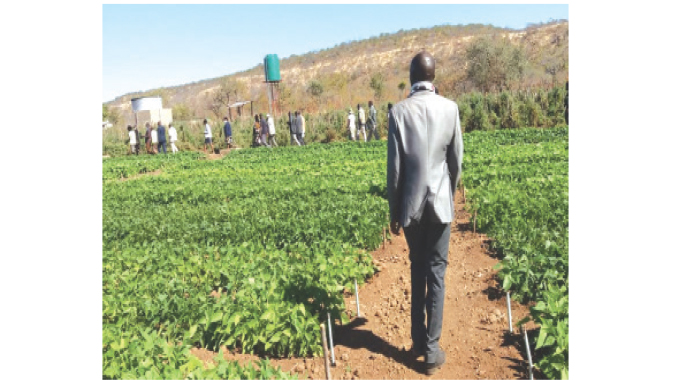
Leonard Ncube and Leonorah Ncube, Victoria Falls Reporters
VILLAGERS in Kasibo, Hwange, have restored a wetland that had dried up due to human activities, including overgrazing.
This is in line with Government’s drive to protect wetlands in the country.
The community had been facing water challenges over the past few years, leading to the death of livestock.
Wetlands are areas where water covers the soil, or is present either at or near the surface of the soil all year or for varying periods of time during the year, including during the growing season.
They are so common the world over and are known by many names that include; marshes, estuaries, mangroves, mudflats, mires, ponds, fens, swamps, deltas, coral reefs, billabongs, lagoons, shallow seas, bogs, lakes, and floodplains.
Wetlands provide habitat for thousands of species of aquatic and terrestrial plants and animals and are valuable for flood protection, water quality improvement, shoreline erosion control, natural products, recreation, and generally beautifying natural scenery.
Kasibo villagers, after realising that they can get livelihood from the wetland, approached World Vision and World Food Programme who partnered with Agritex to protect the wetland by fencing it.
A small dam that is fed by the wetland had also dried up.
Following the protection and resuscitation of the wetland, the weir accumulated large volumes of water during the 2020-2021 rainy season and villagers have started a small 2-hectare community garden which is sustaining them.
World Vision also donated solar pumping equipment to irrigate the small garden.
An overnight storage tank has been installed while a solar powered drying hall has been built.
A group of 16 villagers have also been trained on beekeeping and have started the project tapping into abundance of bees around the wetland.
The garden has 40 members, 30 of them being women and are growing sugar beans, tomatoes, onions and green vegetables.
Villagers now also have thatch grass closer to their village in the wetland.
Recently, the Environmental Management Agency (Ema) hosted belated commemorations of World Environment Day at the wetland where the 22 villagers who have been trained in beekeeping also graduated.
Mr Tapera Mugoriya, a director in the Ministry of Local Government and Public Works, represented Matabeleland North Minister of State for Provincial Affairs and Devolution.
Present at the occasion were head of various Government departments, Zanu-PF Hwange District leadership, environmental organisations, traditional leaders and community members.
World Environment Day is observed annually on June 5 and this year’s global theme is: “Ecosystem restoration.”
Chairperson of the project Mrs Elizabeth Tshuma said the wetland had transformed people’s lives.
“This garden has changed our livelihoods. We are now able to pay school fees and get transport money to go to clinic. We look forward to extending it into a fully-fledged irrigation scheme so that we increase the intensity of farming. We are grateful to Ema, World Vision and others because they have been helping us with knowledge and skills,” she said.
Ema Matabeleland North provincial manager Mrs Chipo Mpofu-Zuze said the Kasibo model is a true testimony of how wetlands can be restored.
“This is true testimony of how we can best manage our resources and environment as an ecosystem. When the project started it was just a dip tank after realising that people were walking long distances with their livestock but later on it grew into a weir. We are seeing a gradual growth.
“Close to the garden there was a wetland which was seriously degraded because people had allowed livestock to graze there while others were cultivating. So we came in and raised awareness on the importance of protecting and restoring wetlands,” said Mrs Mpofu-Zuze.
She said villagers approached World Vision and World Food Programme who fenced it and gradually the area was restored and vegetation cover restored.
The whole wetland is now covered with water which is flowing out towards the weir.
Water plants such as reeds have started growing.
The community is now earning a living from the natural facility.
Mrs Mpofu-Zuze said Ema engaged Mr Elias Mzamba, a renowned bee farmer in Hwange District, to train villagers and 22 people were capacitated.
Already there are bee hives that have been mounted and colonized by bees.
Hwange has serious challenges with veld fires and Mrs Mpofu-Zuze said such projects will increase environmental awareness and encourage community members to protect their surroundings.
“We are hopeful the water coming from the wetland will sustain the area. This is what we want and other communities should learn from Kasibo and this will turn our area into sustainable areas to meet the drive towards national vision towards 2030,” she said.
Zimbabwe is a signatory to the Ramsar Convention on Wetlands of 1971 and has domesticated provisions for the protection of wetlands under the Environmental Management Act (Cap 20;27), Statutory Instrument 7 of 2007 on Environmental Management (Environmental Impact Assessment and Ecosystems Protection) Regulations. — @ncubeleon
